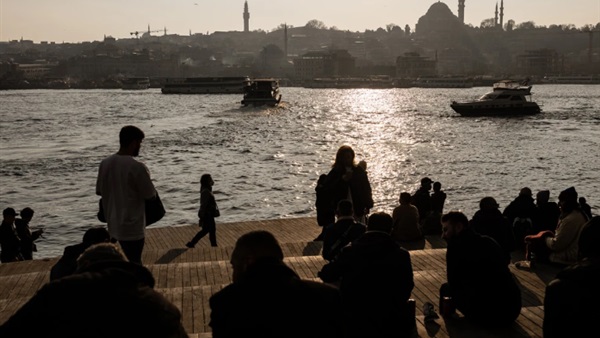Erdogan’s Turkey Faces a Growing Exodus Ahead of Elections

When Turkish data scientist Bulut Ficici was approached by a
Dutch recruiting firm for a Netherlands-based job, he didn’t think twice.
Almost a year ago, the 25-year-old packed his bags, left behind his life and
friends in Istanbul, and joined an ever-growing exodus of young, disillusioned
Turks who say they have, for now, given up on their country.
“I love Turkey, but I wasn’t even able to afford living in a
city like Istanbul anymore. Politics and the economy have been going downhill.
It was time to go,” he said during a phone call from his apartment in
Rotterdam, Netherlands.
As elections, now set to take place on May 14, are fast
approaching, many Turks are voting with their feet, citing mistrust of the
government, a crackdown on freedom of speech, inflation, and deteriorating
business opportunities as part of the reason. More than 70 percent of people
ages 18 to 25 said they would prefer to live elsewhere while more than 60
percent said they didn’t see a good future in Turkey, according to a recent
survey by German-based Konrad Adenauer Foundation. But it’s not just the
younger population that has been looking for a way out. Turkey has lost the
third-most millionaires in the world, according to a report by the Republican
People’s Party, the main opposition to Turkish President Recep Tayyip Erdogan’s
Justice and Development Party (AKP). Published in 2021, the report said that
23,000 businesspeople, including 10,000 millionaires, left Turkey within the
span of three years leading up to 2021. In 2020, the outflow of Turkish capital
reached almost $44 billion, a steep increase over the $4 billion that flowed
out in 2012.
It hasn’t always been that way. When Erdogan first took
national office in 2003 as the country’s prime minister, things were looking
up. The Turkish economy was prospering and unemployment rates were falling.
This year’s upcoming centennial of the republic was supposed to be a joyous
celebration of success. But instead, the “New Turkey” Erdogan sought to
establish increasingly slid into authoritarianism, said Ahmet Erdi Ozturk,
associate professor of politics at London Metropolitan University.
“We’ve seen several waves of emigration since the Turkish
republic was established, but this new wave picked up since the government
crackdown on the 2013 demonstrations at Istanbul’s Gezi Park as well as the
failed coup in 2016. Since then, people of all backgrounds are leaving:
students, young professionals, celebrities, the upper-middle class, and even
religious groups,” Ozturk said. They are joining a diaspora community that has
largely settled in Europe in recent decades; according to the country’s
Ministry of Foreign Affairs, more than 6.5 million Turks currently live abroad.
It might not get any better. Erdogan’s AKP is facing a tough
campaign amid dwindling support in the polls, mostly over its management of the
country’s economy. But the six main opposition parties have not yet declared a
presidential candidate for the race, and time is running out quickly.
“People need hope for
a positive transformation in order to return,” Ozturk said. “If there’s a
government change and restoration process, we could possibly see
return-migration, but right now, most of the people who left are not seeing
hope for change. It seems that after the elections, we could just be seeing
another wave of people wanting to leave Turkey.”
Although Ficici said he enjoyed his job and life in the
Netherlands, he hoped that one day—in his 30s or 40s—he might be able to “live
a good life” back at home. He refers to his generation as unlucky: “We were
happier when we were growing up. The economy was better and our families didn’t
live on the brink of financial survival. Today, most people I know are
tense—not just because of economic hardship but also because of the government.
We’re afraid to speak up or to share our thoughts on social media. There’s a
sort of collective fear that makes people want to leave.”
The recent exodus is taking its toll on Turkey. “We hear so
many people who are talking about leaving, and that’s a serious problem. They
are the most important capital Turkey has, and it’s draining away,” said Alper
Coskun, a senior fellow at the Carnegie Endowment for International Peace. “The
disconnect between the AKP and its policies and the younger generation is
obvious. The higher support for the AKP manifests itself in the older
generation.”
Gokce Tunca, 39, said she’s not supportive of the current
leadership in her country. “We’ve seen the same government for the last two decades.
They have their own style, and it doesn’t suit me,” she said from France, where
she’s been living since 2019. An electrical engineer from the Turkish
Mediterranean city of Izmir, Tunca applied for an internal posting overseas
with the same French company she had already been working with in Turkey. She’s
connected with at least 20 other Turkish people who, like her, left Turkey in
recent years and are now also based in the southern French city of Grenoble.
“I’d definitely go back to Turkey if conditions improve.
Right now, I feel powerless, unable to change anything. Purchasing power has
steadily decreased over the years, and I don’t trust the political system.
That’s part of why I decided to leave,” she said, but not without a glance
back. “France is a nice place to live, but it’s not home.”





